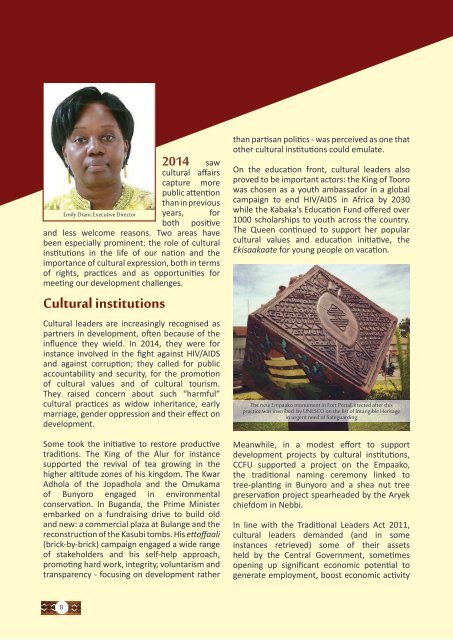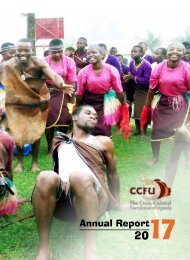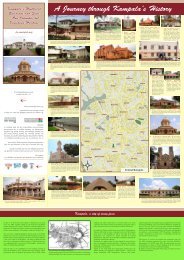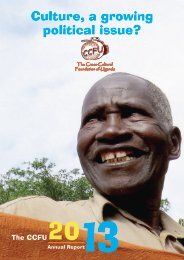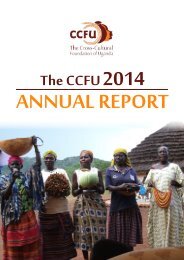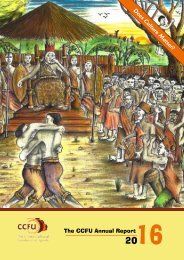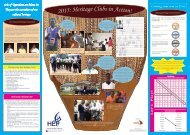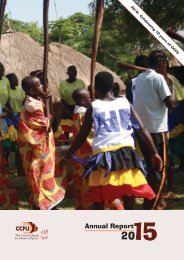CCFU Annual report 2014
You also want an ePaper? Increase the reach of your titles
YUMPU automatically turns print PDFs into web optimized ePapers that Google loves.
Emily Drani, Executive Director<br />
<strong>2014</strong> saw<br />
cultural affairs<br />
capture more<br />
public attention<br />
than in previous<br />
years, for<br />
both positive<br />
and less welcome reasons. Two areas have<br />
been especially prominent: the role of cultural<br />
institutions in the life of our nation and the<br />
importance of cultural expression, both in terms<br />
of rights, practices and as opportunities for<br />
meeting our development challenges.<br />
Cultural institutions<br />
Cultural leaders are increasingly recognised as<br />
partners in development, often because of the<br />
influence they wield. In <strong>2014</strong>, they were for<br />
instance involved in the fight against HIV/AIDS<br />
and against corruption; they called for public<br />
accountability and security, for the promotion<br />
of cultural values and of cultural tourism.<br />
They raised concern about such “harmful”<br />
cultural practices as widow inheritance, early<br />
marriage, gender oppression and their effect on<br />
development.<br />
Some took the initiative to restore productive<br />
traditions. The King of the Alur for instance<br />
supported the revival of tea growing in the<br />
higher altitude zones of his kingdom. The Kwar<br />
Adhola of the Jopadhola and the Omukama<br />
of Bunyoro engaged in environmental<br />
conservation. In Buganda, the Prime Minister<br />
embarked on a fundraising drive to build old<br />
and new: a commercial plaza at Bulange and the<br />
reconstruction of the Kasubi tombs. His ettoffaali<br />
(brick-by-brick) campaign engaged a wide range<br />
of stakeholders and his self-help approach,<br />
promoting hard work, integrity, voluntarism and<br />
transparency - focusing on development rather<br />
than partisan politics - was perceived as one that<br />
other cultural institutions could emulate.<br />
On the education front, cultural leaders also<br />
proved to be important actors: the King of Tooro<br />
was chosen as a youth ambassador in a global<br />
campaign to end HIV/AIDS in Africa by 2030<br />
while the Kabaka’s Education Fund offered over<br />
1000 scholarships to youth across the country.<br />
The Queen continued to support her popular<br />
cultural values and education initiative, the<br />
Ekisaakaate for young people on vacation.<br />
The new Empaako monument in Fort Portal, erected after this<br />
practice was inscribed by UNESCO on the list of Intangible Heritage<br />
in urgent need of Safeguarding<br />
Meanwhile, in a modest effort to support<br />
development projects by cultural institutions,<br />
<strong>CCFU</strong> supported a project on the Empaako,<br />
the traditional naming ceremony linked to<br />
tree-planting in Bunyoro and a shea nut tree<br />
preservation project spearheaded by the Aryek<br />
chiefdom in Nebbi.<br />
In line with the Traditional Leaders Act 2011,<br />
cultural leaders demanded (and in some<br />
instances retrieved) some of their assets<br />
held by the Central Government, sometimes<br />
opening up significant economic potential to<br />
generate employment, boost economic activity


